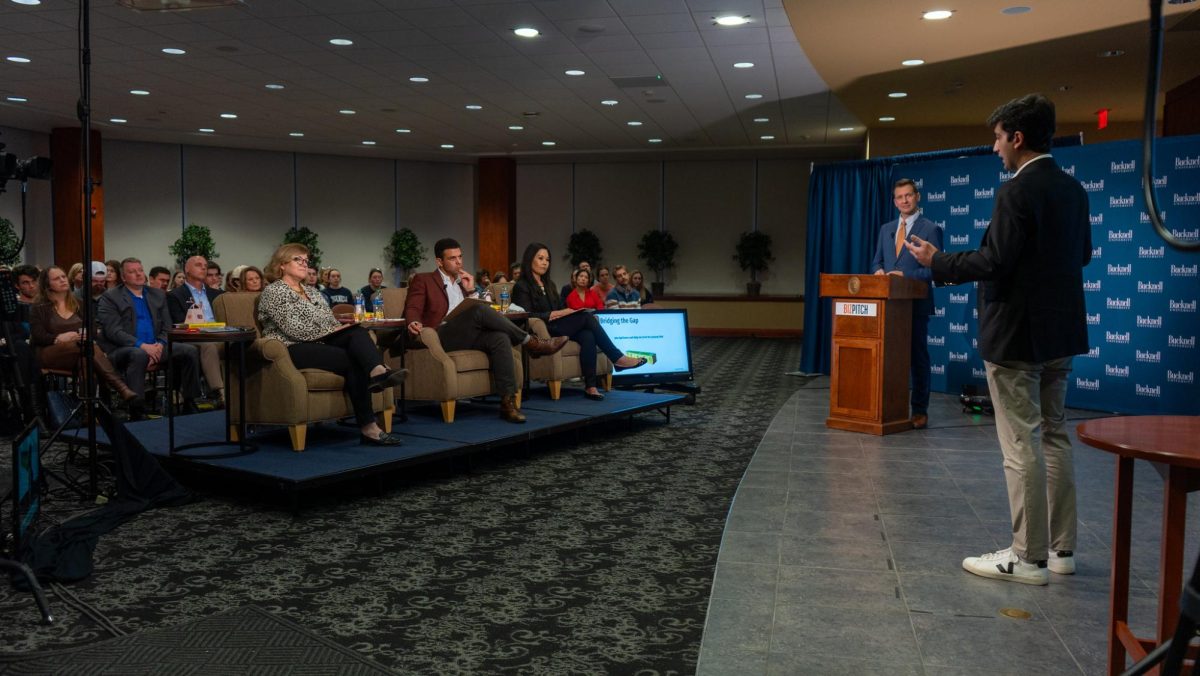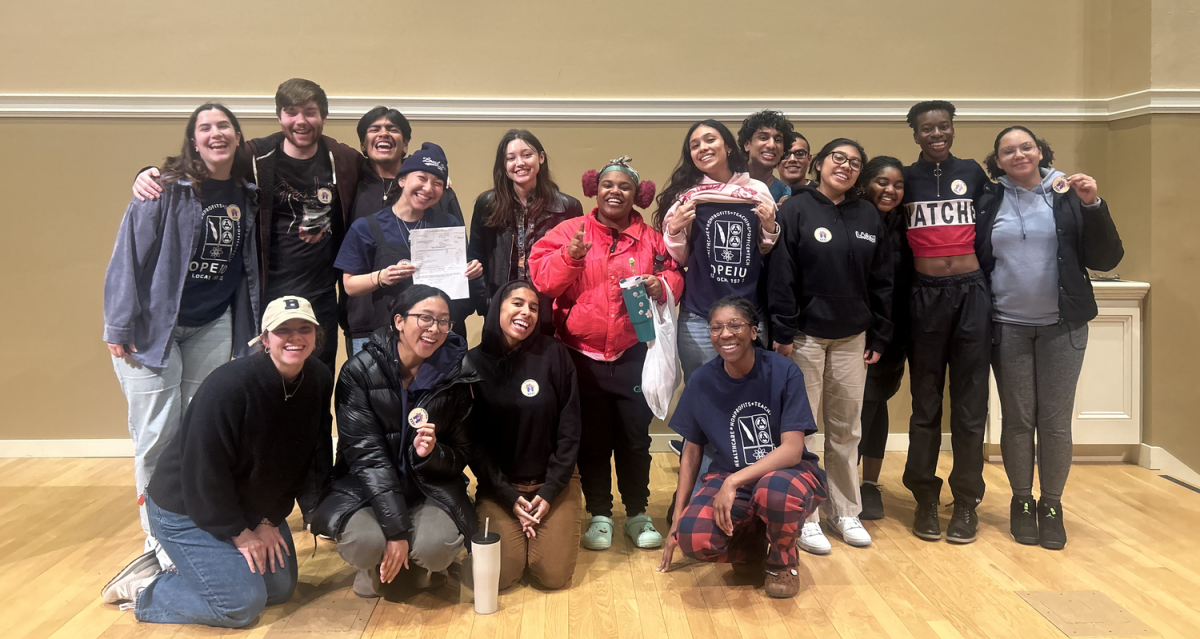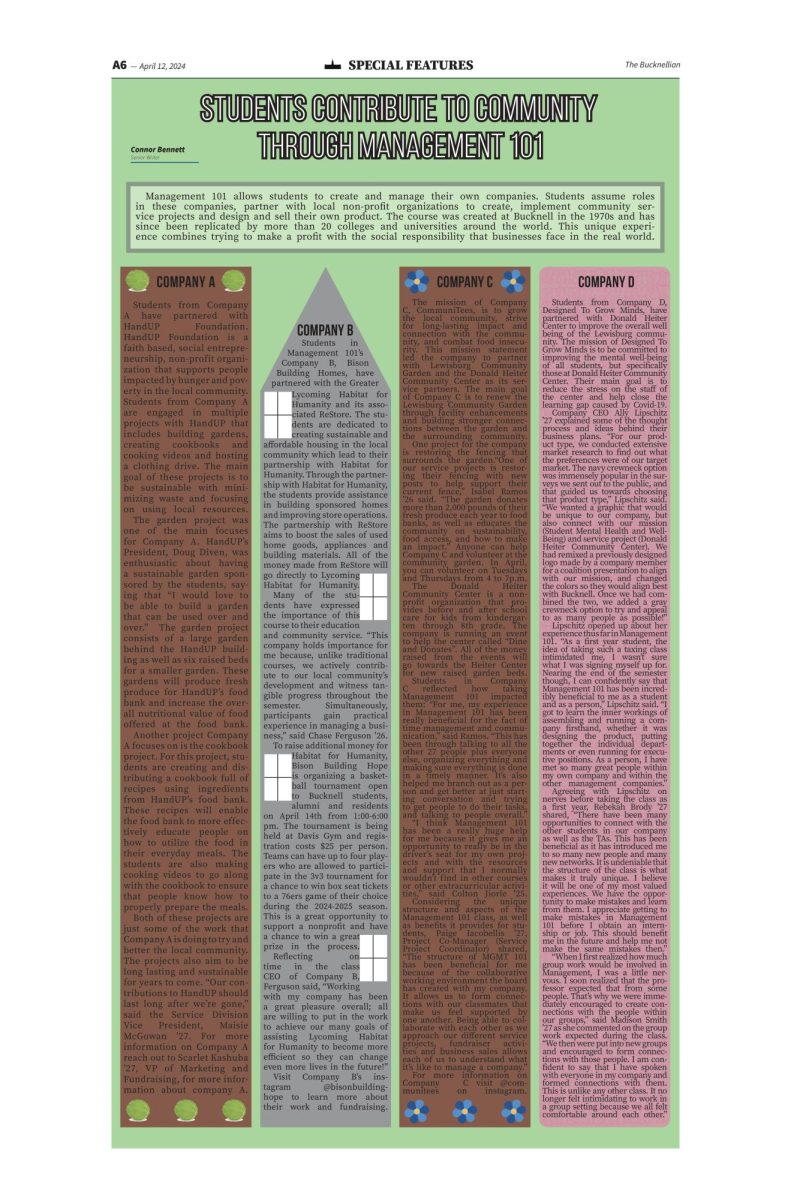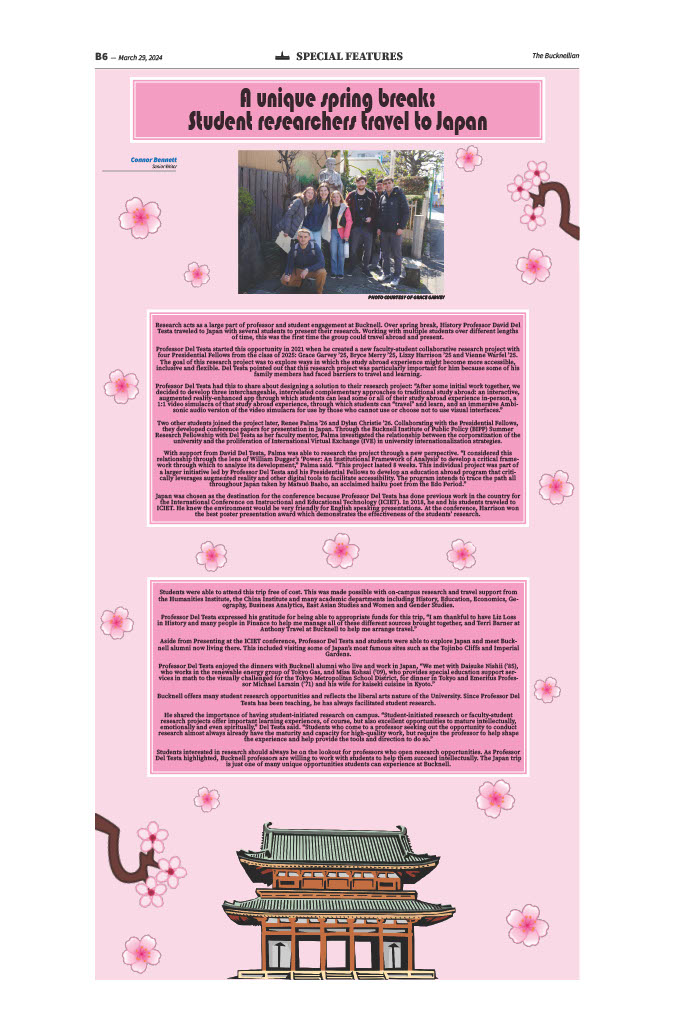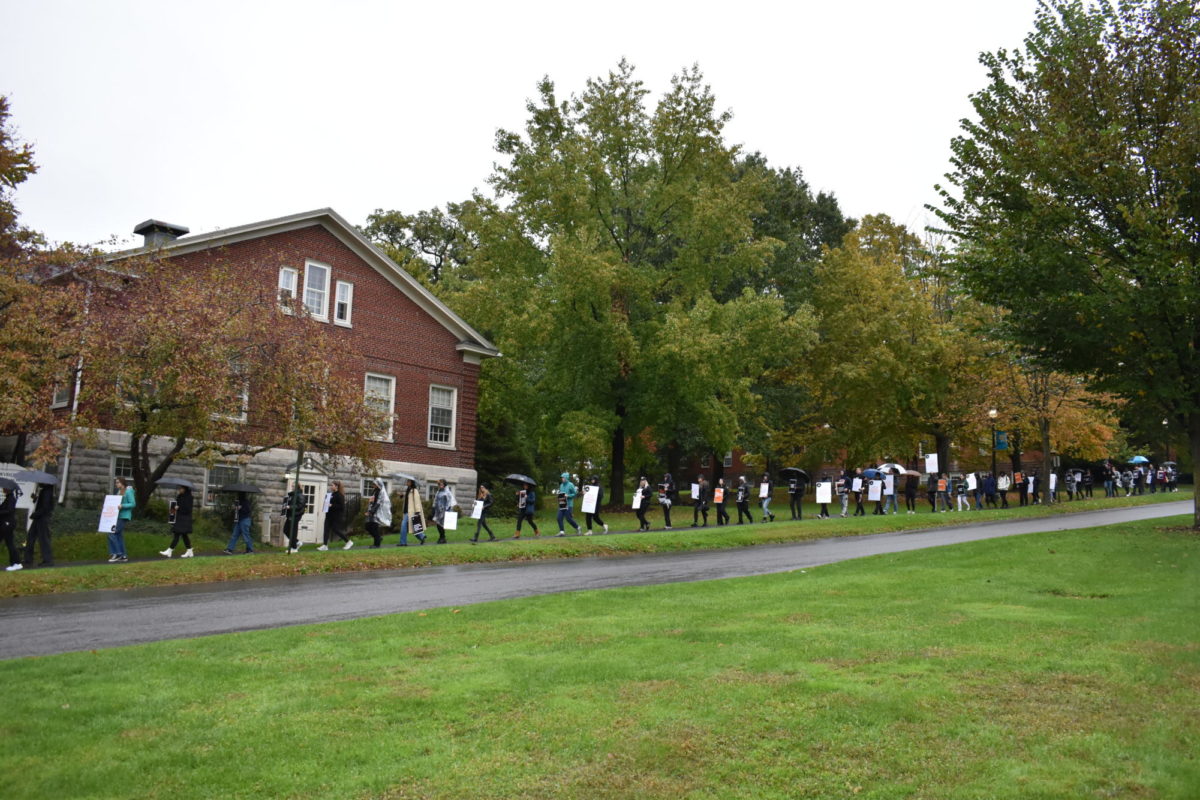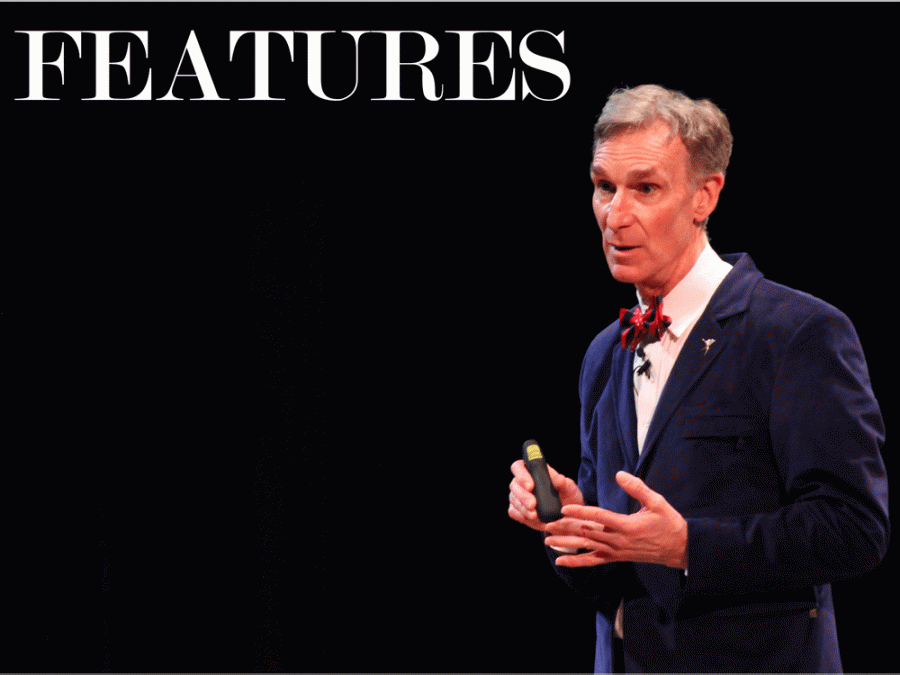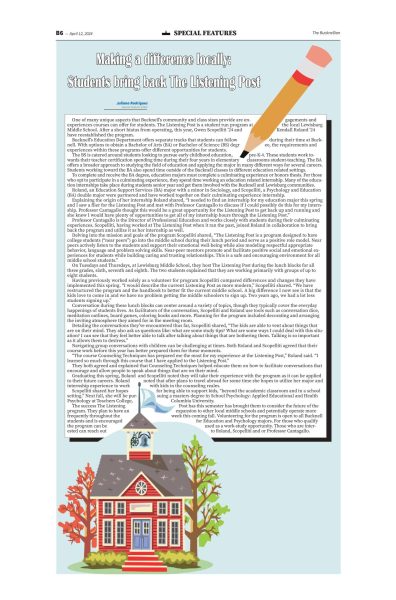Science Rules
February 25, 2016
At noon on a typical Tuesday, University students can be found lined up to grab lunch at the stations in the Bison or Bostwick Marketplace. However, on Feb. 23 a line of students circled the perimeter of the Weis Center for the Performing Arts in anticipation of the arrival of Bill Nye the Science Guy. Tickets for the event ran out by 3 p.m., and students began packing the Weis Center lobby long before 7 p.m., when Nye was scheduled to present. Nye’s lecture focused heavily on climate change and space exploration, with the resounding declaration that “We can, dare I say it, change the world!”
[(1 TV personality scientist) x (1000+ attendees) / (politically charged environmental concerns) + (Weis Center for Performing Arts)= An Evening with Bill Nye the Science Guy]
Climate change: What can we do to help?
While Nye presented some small changes our community can implement to help reduce climate change, such as turning off the lights when students leave their dorms and reducing waste by recycling, he also emphasized the need for “big ideas” if legitimate systemic change is to be realized.
“I ride my bike as my primary transportation. This both for commuting to campus for teaching and to get around town. I minimize the number of lights on in my house. My wife and I keep our heat at 60 degrees in the winter and wear additional sweaters in the house. This question is probably best thought of from a constant point of view–I always ask myself if I can do something different to minimize my energy requirements,” Associate Professor of Geology Rob Jacob said when asked what we can do to help this effort.
Environmental engineering major Katie Pendelberry ’19 stressed the importance of “closing doors fully, keeping rooms at a lower temperature, not wasting food, walking, turning off lights of rooms not in use, energy efficient light bulbs, lowering the water temperature in hot water heaters, and decreasing water usage.”
Nye claims that Pennsylvania could be 100 percent powered by renewable resources by 2050. Professors and students knowledgeable about the topic commented on whether or not they believed this was feasible.
“This is not my area of expertise, but Pennsylvania does not have the solar potential of the Southwest (where clouds are seldom), the geothermal heat that Iceland has, or the open space close to populations for wind farms. Again, these are obstacles, but not impossibilities,” Jacob said.
“I think it is most likely possible, but not probable. I’m from upstate New York, so I can’t speak for the area, but because of the importance of coal mining and industry in the economy and historical mindset of the people, it would be difficult to transition from coal to renewable sources. The movement could begin in Philadelphia, with its proximity to the ocean for tidal and ocean wind energy, and because of the large amount of money there for investing. Philadelphia would have to be the epicenter of change and that most likely won’t happen by 2050,” Pendelberry said.
So how soon do we need to transition from fossil fuels to renewable sources as our primary source of energy, and how can we accomplish this?
“The longer we wait, the worse it will be for future generations. Staged but continuous evolution of our energy sector is necessary. For example, we could next push for our long distance trucking fleet to change their use of fossil fuel. Diesel is more efficient than unleaded gas, but natural gas engines are more efficient than diesel. It will take longer to transition this fleet to renewable energy, but we still depend on this trucking industry for our entire economy,” Jacob said.
“We needed to transition to renewable resources 50 years ago when the highway system and serious infrastructure was being built after the war. But if not then, then now, and quickly. We need to transition to improve the health and welfare of our environment and for ourselves (pollution can be extremely detrimental, both in air, water, and soil). This will also decrease our dependence on foreign oil and the risk that domestic drilling poses, from oil spills to water table contamination from wells. And practically speaking, fossil fuels will be unable to fulfill our energy needs in the future, and not taking action now will dig a deeper hole for future generations to climb out of in terms of environmental and atmosphere destruction, and the stability of society linked to dependable energy sources. The ’70s oil crisis was a minor precursor,” Pendelberry said.
“The fact that Nye said Pennsylvania could be 100 percent powered by renewable resources by 2050 gives me optimism for the future. As a PA resident, I would love to see more reliance on renewable power. I think this plan is possible, but unfortunately highly impractical due to coal companies having such a large influence in the government and economy. The coal regions are already the most economically stratified part of PA, and many feel like the loss of coal mining would intensify the current problem. Thousands of miners who have worked for coal companies their entire lives would be out of work, and would need to be retrained to work in the new energy sector, which is unlikely due to the cost (and many residents not willing to change). While the 100 percent renewable plan would benefit the state’s future and is supported by many urban residents, it would increase unemployment and negatively impact the economy in an already stratified region and remove a large source of the state’s income,” civil engineering major Matt Geiger ’19 said.
Political Implications:
Nye said he wanted the University’s major takeaway to be acknowledging that “it’s real.” He also emphasized students’ civic responsibility to vote, highlighting the fact that none of the Republican presidential candidates, save John Kasich, believe that climate change is even real.
“If you’re a climate change denier, vote on Wednesdays,” Nye said.
When asked what people who have no scientific expertise can do to help, Nye said “VOTE!” How can participating in the upcoming election impact global climate change?
“[G]overnment is responsible for having a long-term view toward society’s well-being, as many of the constituents are looking more short-term. It is the constituents’ responsibility to make sure that those representing us actually represent what we believe to be the best way forward. If we don’t vote, this system fails,” Jacob said.
“Voting allows each person’s views to be heard, either through satisfaction with many, one, or no political representatives. But any dislike of current and proposed policies won’t be recognized without a vote for or against. Even if the majority of the population does believe in climate change and pro-environmental policy, that view won’t be heard if only the anti-climate change minority votes. The result would be an anti-climate change government,” Pendelberry said.
What are the implications of climate change denial? Why do you think it is beneficial for politicians to ignore this problem–is it because people don’t want to believe in global warming, so they are more likely to align themselves with those who confirm their beliefs?
“I do not know that there is only one reason for why government officials deny or don’t recognize anthropogenic climate change. Some companies tried to avoid it because it would be bad for their current business model and feared change. I also think that some of the extremist points of view (e.g. anti-technology or return to the pre-industrial society we had) negatively affected some people. I would also suspect that there are individuals who don’t believe that humans can influence the earth and how it works,” Jacob said.
“I don’t believe that climate change is the actual issue, although there are disputes about the data and its interpretation. Climate change is being used as a tool to scare voters and the populous by allying pro-climate change with ideas, like less domestic oil production and fewer investments in traditionally strong economies in the United States like coal mining and oil and natural gas drilling. Climate change also appears to be made religious in some respect, and people can get defensive about their religion and their own religious conviction, and attacking climate change may be viewed as a way to validate one’s own religious conviction. Politics combines many disparate things together–religion, environmental policy, social class, race, gender, sexual orientation, economic policy, international relations–and can create beliefs about certain views through associations with other views, that in actuality can be wholly separate and needn’t be combined,” Pendelberry said.
